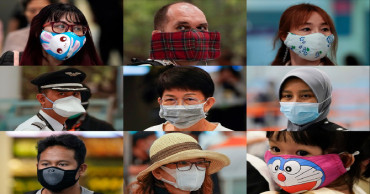protection
As per Vienna Convention, host country must ensure protection of all diplomatic personnel: US State Dept
The United States has said the safety and security of their diplomatic personnel and facilities are of utmost importance.
“So, I’m not going to get into the specifics about security details concerning the U.S. embassy or its personnel,” Vedant Patel, principal deputy spokesperson for the US Department of State, said during a press briefing on May 15 (US time) at the State Department while responding to a question.
He, however, noted that as per the Vienna Convention on Diplomatic Relations, any host country “must uphold its obligations to ensure the protection of all diplomatic mission premises and personnel and take all appropriate steps to prevent any attack on personnel.”
Read: US doesn’t endorse one political party over another in Bangladesh: State Department
Patel made the remarks after Bangladesh decided not to provide additional security escorts for a number of foreign diplomats, including the US and UK envoys, in Dhaka.
Foreign Minister Dr AK Abdul Momen yesterday (May 15, 2023) said, “If they want it, they can get it in exchange for payment. We won’t provide this extra (security) escort service with taxpayers’ money.”
“In developed countries, no government provides such extra facilities,” Momen said.
Read more: US calls upcoming national election an 'internal' affair of Bangladesh
The minister said there has been no deterioration of the law and order situation that such service is required.
2 years ago
2 workers without adequate protection die inside septic tank in Ctg
Two workers inhaled toxic air and died as they were working inside a septic tank without adequate protective gear - a common occurrence across the country, this time at an under-construction building in Hathazari upazila of the district on Tuesday.
The deceased were identified as Md Yeasin, 27, and Md Badsha, 26. Their details could not be known immediately.
Md Shamim, an official at the upazila Fire Service and Civil Defence department, said three workers entered the septic tank to clean it at Dakshin Madarsha village around 4.30pm.
Two of the workers fell sick due to inhalation of toxic gas in the tank, Shamim said.
On information, they rushed to the spot and pulled the workers out of the tank around 5pm, he said, adding that they were rushed to a hospital where physicians declared them dead upon arrival.
Md Alamgir, a sub inspector of Madunaghat police outpost under Hathazari police station, also confirmed the deaths.
3 years ago
Police too have the right to protection when under attack, Hasina tells Parliament
Prime Minister Sheikh Hasina on Thursday told the Parliament that police have the right to protect themselves when they come under attack.
“Won’t the police have the right to protect themselves when they come under attack just because they are police? Their remarks seem that they (police) can do nothing even after bombs, sticks and brickbats are hurled toward them or they come under gun attack,” she said.
Hasina made the remarks as opposition BNP MP Rumeen Farhana earlier claimed in the House that the party’s recent protest programmes came under attacks in different places including Bhola contrary to the PM’s clear instructions.
The premier said police did nothing where BNP’s movement and programmes were peaceful.
“It is normal that opposition parties will wage movement. Yes, I told police to do nothing. It is right. But the police said (did) nothing first. If a man comes under attack, that person has the right to protection, let alone police,” she said.
Hasina, also the Leader of the House, was delivering her valedictory speech in the 19th session of the current parliament.
Read: BNP vows to avenge blood of its slain workers by ousting the govt
She said she promised that no one would say anything in case of peaceful procession and movement. “Where the programmes are peaceful, no one would anything there,” she said.
She said BNP men try to go for attack or create a situation for media coverage.
Criticising a section of media and opposition parties, the PM said they are spreading frustration in recent times as if everything is going to be destroyed. “But they (critics) are in good condition.”
Referring to a recent report of the World Bank, she said Bangladesh is not at food risk. The IMF also in its evaluation on August 16 last remarked that Bangladesh is in no crisis, she added.
3 years ago
COVID-19 vaccination gives 97.4 pc protection from coronavirus infection
The COVID-19 vaccination provides protection at a rate of 97.4 per cent against coronavirus infection, said a study conducted by Apollo Hospital Group to investigate the occurrence of SARS-CoV-2 infection among the symptomatic-vaccinated healthcare workers (HCWs) and to analyze the severity of their disease, reports ANI.
Read:Vaccine inequity biggest barrier to ending pandemic: WHO chief
The study conducted on 3,235 HCW (2480 received both doses while 755 received a single dose) showed that COVID-19 infection after vaccination is primarily minor and did not lead to severe disease.
The symptomatic post-vaccination infections in these HCWs were evaluated for the study, and it was found that eighty-five of 3235 (2.63 per cent) vaccinated HCWS acquired the COVID 19 infection after vaccination during the study period.
"Of these, 65 (76.5 per cent) were fully vaccinated (FV), and 20 (23.5 per cent) were partially vaccinated (PV) and the protection rate of vaccination was 97.4 per cent," the study said.
Read:What is a COVID-19 vaccine “breakthrough” case?
The study noted that an odds ratio of acquiring infection among females was 1.84 times higher, but explained that it was "mainly because of their greater involvement in the patient care as nursing personnel. The chances of infection were the highest in the medical and nursing personnel as compared to paramedical, administrative and supporting staff." Among the HCWs studied, only two required hospitalization (0.06 per cent), none needed an intensive care unit (ICU) admission and there were no deaths.
The study further added that in all the 85 infected cases, there were mild symptoms such as cough, fever, malaise and loss of taste and smell.
4 years ago
Protect consumption, promote employment in next budget: Debapriya
Consumption protection and employment promotion should be the dual priorities of the upcoming national budget during the Covid-19 pandemic, said renowned economist and public policy analyst Dr Debapriya Bhattacharya.
To this end, the government has to give direct and substantive fiscal support to the traditionally disadvantaged communities as well as to the “new poor”, he said in an interview with UNB about the national budget for fiscal year 2021-22.
Dr Debapriya said the new budget also needs to promote domestic market-oriented industrial diversification and introduce a universal social protection system.
He said the expansionary fiscal policy should focus not on maximising the public expenditures for health exigencies, but also put more disposable income in the hands of disadvantaged households and investable resources in the hands of micro, small and medium enterprises (MSMEs).
Also read: Dhaka, Delhi need much stronger framework for future economic ties: Debapriya
The international noted economist said the new budget should neither increase tax rate nor apply new taxes, but should focus on improving efficiency of tax administration to prevent tax leakages and evasion, stop undue exemptions and definitely discontinue favouring black money launderers.
Core Budget with a longer time frame
Noting that one of the fundamental issues for the next budget will be dealing with the protracted impact of the Covid-19, Dr Debapriya said the last budget was done under the incorrect assumption that the pandemic would vanish within 3-4 months and then normalcy would be restored in the economy.
“At that time, we pointed out that even if health emergencies subside, socio-economic impact of pandemic will be felt much longer. Now 12 months later we’re in the midst of another Covid peak,” he said.
The basic point is that, under the circumstances, public expenditure choices and other fiscal decisions within one-year time-frame is not appropriate from policy perspectives, he added.
“So, a “core budget” focused on defeating the pandemic and recovering from the fall-outs demand a time policy frame of at least two-three years. This has to be aligned with the current Five Year Plan (2021-25), SDG delivery schedule and climate action commitments,” he said adding that a core budget is essential identifying major policy instruments which will ensure the reprioritised development outcomes.
Also read: Development community needs to support graduating LDC: Debapriya
“The development variable needs to be reprioritised from the point of view of employment retention and generation and no less important will be protection of consumption, otherwise poverty rate and inequality will increase further,” he said.
Favouring an expansionary fiscal policy, Dr Debapriya emphasised the need for accelerating public expenditures and improving supply of liquidity to boost domestic demand for goods and services.
Spending more is the challenge
Dr Debapriya Bhattacharya said the major challenge for the government is that even if it wants to enhance public expenditures, it is not being able to do so. One critically constraining factor is this regard is the stagnating (if not falling) tax-GDP ratio. Low utilisation of foreign aid is further increasing resource pressure.
However, the government’s inability to spend whatever money it has is due to low absorptive capacity of the public agencies, he said, adding that poor quality of public expenditures remains a major concern too. Streamlining the implementation of public expenditure portfolio will be an overriding priority for the next budget, mentioned Dr Debapriya.
Mentioning that there has been the marginal increase in the budget deficit (the deficit is now around 5 percent of GDP) over the last two-three years, he said, “In the financing of the budget deficit, we are using costlier domestic borrowing rather than international concessional funds. “And the utilised international funds are mostly less concessional, together resulting in increased debt burden”.
The public policy analyst said that the post-Covid mid-term recovery programme demands structural reforms to make the fiscal framework efficient and effective. “The recovery demands a high-energy fiscal multiplier effect.t. For that the government also not only has to spend more, but it will also have to give the money to those people who have greater propensity to consume and invest,” said the macro-economist.
Need larger direct fiscal transfer
“So, the very important part in the Covid recovery would be in the future to have much more targeted fiscal transfer along with food support for the traditionally marginalised communities as well as to the newly disadvantages households (the so-called new poor)” he said. He held that while the government announced programmes are in the right direction, they are miniscule in comparison to need and often implemented in a deficient way.
Dr Debapriya maintained that overwhelming portion of the disbursed pandemic-related public support (stimulus package) went to the big businesses, while a small portion to MSMEs, informal sector and other disadvantaged communities and activities.
It is obvious that these people will not be able to off-set the adverse fall-outs of the pandemic through monetary policy measures including the ones with interest rate subsidy. Thus, it calls for food support and direct cash transfer in larger volume through effective digital financial inclusion, he opined.
Use domestic demand to accelerate growth
Given the emerging global situation and our recent Covid-time experience, Bangladesh should boost its aggregate demand for GDP growth by aggressively stimulating domestic demand. “For example, we need to invest further in agro-based manufacturing, post-harvest mechanisation in agriculture, digital platform-based activities,” he said.
Also read: New conversation on int'l dev cooperation needed: Debapriya
“Since the international market will remain volatile in near future, we would need to urgently improve our domestic productive capacity to diversify our labour-intensive manufacturing base for inclusive growth,” said the economist. Upcoming budget should deploy fiscal measures to promote labour productivity across sectors.
Time for universal social protection
Dr Debapriya said the Covid has given us the lesson that Bangladesh needs to move from the safety net programme for the poor to universal social security for all citizens. “We need to move from mere expansion of social safety net programmes to a universal social protection scheme as majority of Bangladesh's population is without any public or private support system,” he added.
The recognised economist pointed out that the except the government employees, the poor who are under the social safety net and a small number of private service holders who have pension schemes, the overwhelming rest of the population are not under any public or private social insurance scheme. “So, it will be only opportune for this year’s national budget to initiate a universal social protection scheme for all citizens of Bangladesh.”
4 years ago
Do masks offer protection from new virus? It depends
People around the world are buying up protective face masks in hopes of keeping the new virus from China at bay. Some companies have required them for employees. Schools in South Korea have told parents to equip their children with masks and hand sanitizer when they return from winter vacation.
6 years ago




.jpg)





